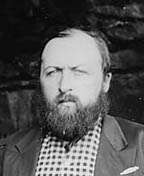John Ceiriog Hughes

John Ceiriog Hughes (25 September 1832 – 23 April 1887), was a Welsh poet and well-known collector of Welsh folk tunes.[1] Sometimes referred to as the "Robert Burns of Wales". Ceiriog was born at Penybryn farm overlooking the village of Llanarmon Dyffryn Ceiriog, in the Ceiriog Valley, which was then in Denbighshire but today is part of Wrexham County Borough, in north-east Wales. His mother Phoebe was a midwife and an expert on herbal medicine. He was one of eight children, and his mother spoiled him as her favourite son. His first attempts at poetry were as a pupil at Nant y Glôg School after his father gave him a book on Welsh grammar, including a section on cynghanedd. At 18 he left the village to live in Manchester. He worked as a grocer there and opened his own shop in 1854. He met William Williams (Creuddynfab), who was a station master in the Pennines, who befriended him and gave him a job on the railway. He was a great influence on the young poet. Williams had been appointed as the first secretary of the National Eisteddfod Society. Hughes decided to sell his shop and concentrate on writing poetry. This change led him to start to drink heavily. He returned to Wales in 1865 after being appointed as station master at Llanidloes. He was employed as a station master and Manager of the Van Railway at Caersws railway station from 1868[2] until his death in poverty in 1887 at age 54, having continued to drink heavily.
Poetry
Through his desire to restore simplicity of diction and emotional sincerity, he did for Welsh poetry what Wordsworth and Coleridge did for English poetry. His work is noted for its attempt to create a new Welsh culture and to raise the status of the Welsh people, following the publication of the Blue Books concerning education in Wales. He wrote lyric poetry based on traditional folk songs. he came to national attention on winning the great Llangollen Eisteddfod in 1858 for his love poem Myfanwy Fychan o Gastell Dinas Brân ("Little Myfanwy from Castell Dinas Brân"). His first collection of poetry was published in 1860 and is called Oriau'r Hwyr ("Evening Hours"). As well as writing poetry he wrote many light hearted lyrics which he adapted to old Welsh tunes, or the original music of various composers. Many of his songs were written to folk airs. Ceiriog Hughes's song lyrics include Dafydd y Garreg Wen ("David of the White Rock") and Ar Hyd y Nos ("All Through the Night"). He also wrote the Welsh words to the song, "God Bless the Prince of Wales" and to the Charles Dibdin song, "The Bells of Aberdovey", which he translated as Clychau Aberdyfi. A Welsh language version of the song The Ash Grove is putatively attributed to Ceiriog Hughes. Another source attributes the Welsh words of the song Men of Harlech, first published in 1890, to him and says that English words were first published in 1893.[3]
Musicologist
His fascination with Welsh folk music led to an investigation of the history of the music, and particularly the harpists who would often accompany songs. This led to a grand project to publish four volumes of Welsh airs, of which only the first volume actually made it to press in 1863: Cant O Ganeuon ("A Hundred Songs").
Bardic name
Like many Welsh poets, he took a bardic name – "Ceiriog", from the Ceiriog Valley, where he was born. In his home village, the public hall contains a memorial inscription to him.
References
- ↑ The National Library of Wales :: Dictionary of Welsh Biography
- ↑ C P Gasquoine (1973). The Story of the Cambrian. Christopher Davies Ltd.
- ↑ Fuld, James J, The book of world-famous music: classical, popular, and folk, Dover, 5th ed 2000, p 394